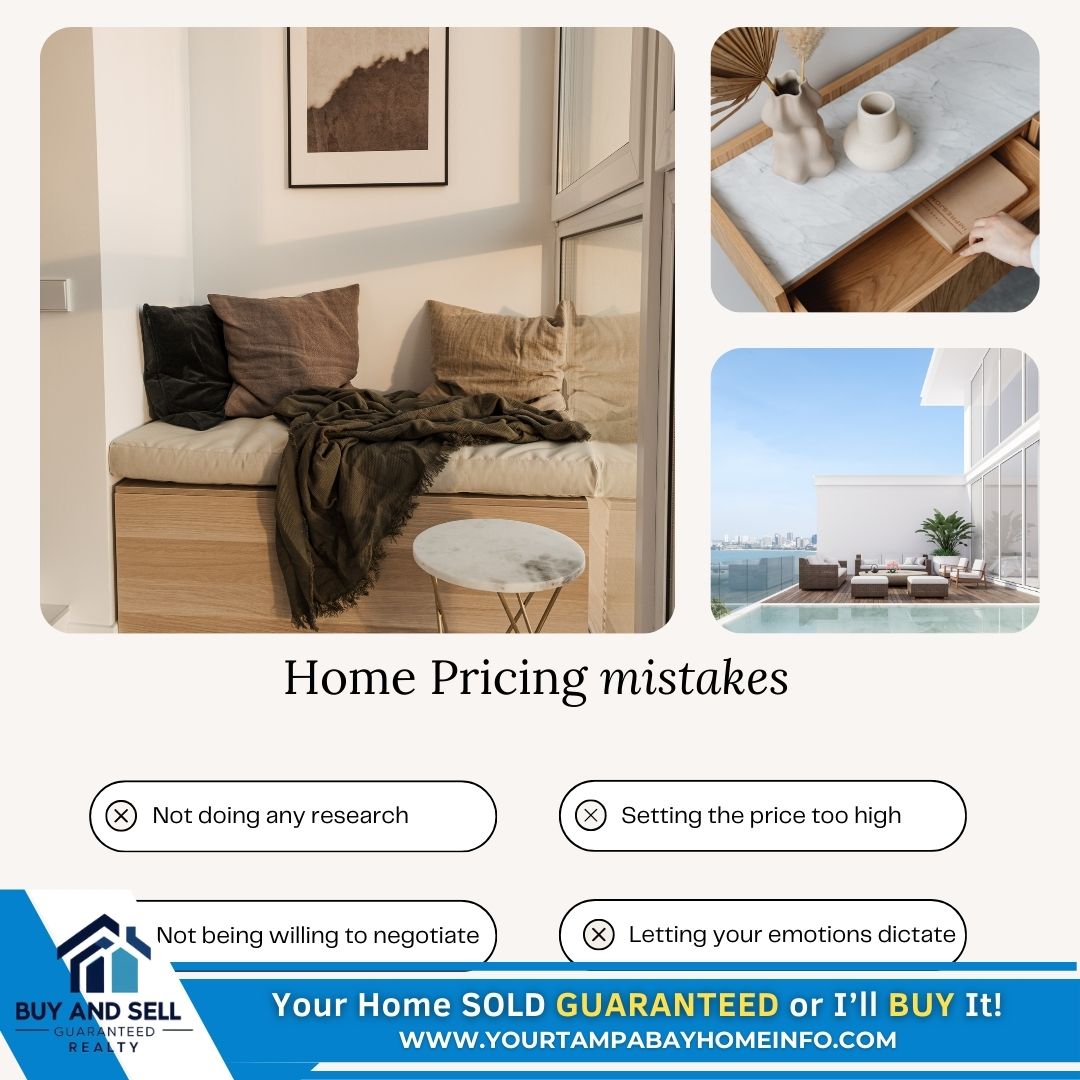Common Home Pricing Mistakes to Avoid

Home Pricing Mistakes
Common Home Pricing Mistakes to Avoid
Pricing your home correctly is one of the most critical steps in the selling process. Setting the right price can attract the right buyers and lead to a successful sale, while pricing mistakes can cause delays or even financial losses. Below are some common home pricing mistakes to avoid:
Overpricing Your Home
One of the most common mistakes is setting the price too high. Overpricing can deter potential buyers, leading to longer market time and eventual price reductions. Buyers often assume that homes lingering on the market may have hidden issues, further reducing interest.
Underpricing to Attract Buyers
On the flip side, underpricing your home might seem like a good strategy to generate interest, but it can backfire. Buyers might question the home's value or quality, and you risk missing out on potential profit. While it’s important to price competitively, make sure the price reflects the true value of your property.
Ignoring Comparable Market Analysis (CMA)
A Comparable Market Analysis (CMA) is an essential tool that helps determine the fair market value of your home by comparing it to similar properties in your area. Ignoring this analysis can result in pricing errors that don’t align with current market trends, leaving your home either overpriced or undervalued.
Failing to Factor in Home Condition and Upgrades
The condition of your home and any upgrades you’ve made can significantly impact its value. Failing to account for these factors can lead to overpricing or undervaluing your property. For instance, a recently remodeled kitchen or a well-maintained garden can justify a higher asking price, while worn-out flooring or outdated fixtures may require a price adjustment.
Letting Emotions Influence Price
Emotional attachment to your home can cloud your judgment when setting a price. While your memories and experiences in the house are invaluable to you, buyers are focused on tangible aspects like size, location, and features. Unrealistic pricing driven by sentiment can deter serious buyers.
Not Adjusting Price After Initial Feedback
If your home isn’t attracting offers, it may be time to reconsider the asking price. Ignoring buyer feedback or failing to adjust your price based on market conditions can prolong the sale process. Be open to reevaluating and making necessary changes to stay competitive.
Conclusion
Avoiding these common pricing mistakes can make a significant difference in your home-selling journey. By setting a fair and competitive price based on market trends, property condition, and buyer feedback, you’ll increase your chances of a smooth and successful sale.
Categories
- All Blogs (743)
- 15 Must-Ask Questions Before You Buy That House (1)
- 24th Anniversary of the Attack (1)
- 5 Star Review (5)
- 7 Seconds (1)
- Back on The Market (1)
- Back The Blue (14)
- Back To School (1)
- Buyer (12)
- Buyer Guarantee (2)
- Buyers Stop Paying Rent (2)
- Cash Offer (21)
- Commission (4)
- did you know (15)
- Divorce, Death, or Diapers — Life Happens. (1)
- Father's Day 2025 (1)
- Flip Your Own Home (1)
- Floor Plan (1)
- Free Market Analysis (2)
- Fun and Festive (27)
- Hispanic Heritage Month (1)
- Holidays (10)
- Home Buying Tips (6)
- Home Equity (1)
- Home Inspection (7)
- Home Purchase (24)
- Home Sale (16)
- Home Selling Ti (1)
- Home Selling Tips (4)
- Hotlist of Homes (16)
- Independence Day (2)
- Inspection Traps (3)
- Just bought (1)
- korean war (1)
- Meet Your New Favorite Dish (2)
- Military (6)
- Mortgage (11)
- National Day (4)
- National Hire a Veteran Day (1)
- National PTSD Awareness Day (1)
- New Construction Homes (2)
- Pending Buyer (1)
- Price Reduced (1)
- Rebate (6)
- Seller (3)
- Seller's Divorce (2)
- St Thomas Day (1)
- Testimonial (1)
- Thisorthat (4)
- Tunnel To Towers (13)
- Veteran (2)
- We’d Love to Hear From You! (1)
- Wear Red Friday (14)
- What’s Your Home Really Worth? (1)
- Worthy Cause (15)
- 📍 3415 Clover Blossom Cir | Land O’ Lakes, FL (1)
- 🎮 It’s National Video Game Day! (1)
Recent Posts











